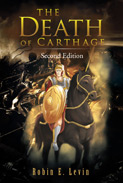
 |
For those familiar with the works of Aristotle, Carthage and its politics are familiar subjects. While Aristotle considered the city as one of the three best-governed ancient Mediterranean civilizations, its chief rival Rome has effectively destroyed it after three major wars. Levin recreates this epic event in a lively, three-part historical narration.
The Death of Carthage explores the three Punic wars between Rome and Carthage through the eyes of three Roman characters: cousins Lucius Tullius Varo and Enneus Tullius and the latter's son Ectorius. These men narrate the events that culminate with the defeat of Carthage and its great military commander Hannibal. While Hannibal remains to be one of the greatest military strategists the world has produced, the Romans counter his military prowess with the bravery of the younger Scipio and the timing and persuasion skills of Cato the Elder famous for his monstrous line: Carthage must be destroyed!
This novel is well researched and documented. The storyline flows naturally with the author's chosen historical events. The synopses in the novel's first and last phases are succinct and readable. Additionally, the author's narrative approach showcases a beautiful blend between literary writing and history.
While it is for the reader to decide whether the author was able to effectively recreate the death of one of the greatest civilizations in history, the novel should be credited for its successful portrayal of sophisticated and intelligent, yet sometimes inhumane, ancient systems of governance. For those with a more skeptical disposition, they may wish to double-check the good amount of citations provided by the author. In general, the novel will be beneficial both to laymen and experts interested in the study of Mediterranean civilizations.